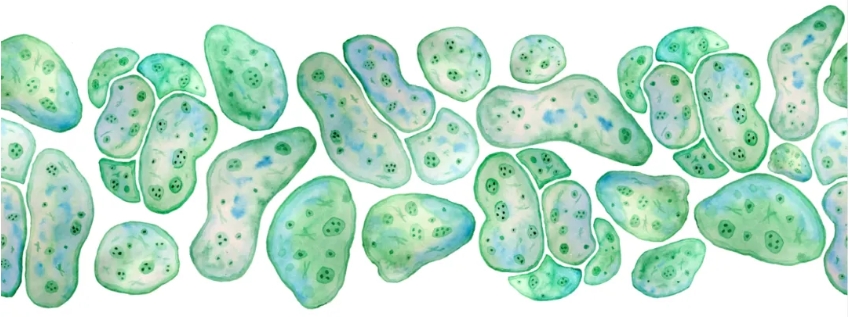Polysaccharide from Chlorella (PFC), as a natural polysaccharide, has attracted a lot of attention from scholars in recent years due to its advantages of low toxicity, low side effects, and broad-spectrum effects. Its functions in lowering blood lipids, anti-tumor, anti-inflammatory, anti Parkinson’s, anti-aging, etc. have been preliminarily validated in vitro and in vivo experiments. However, there is still a gap in the research on PFC as a human immune modulator.
Dendritic cells (DCs) are the most powerful specialized antigen-presenting cells in the human body. The number of DCs in the human body is extremely small, and a cytokine mediated in vitro induction model, namely human peripheral blood mononuclear cell-derived DCs (moDCs), is commonly used. The in vitro induced DC model was first reported in 1992, which is the traditional culture system for DCs. Generally, it requires cultivation for 6-7 days. Mouse bone marrow cells can be cultured with granulocyte macrophage colony-stimulating factor (GM-CSF) and interleukin (IL) -4 to obtain immature DCs (PBS group). Cytokines are added as mature stimuli and cultured for 1-2 days to obtain mature DCs. Another study reported that purified human CD14+cells were cultured with interferon – β (IFN – β) or IL-4 for 5 days, and then cultured with tumor necrosis factor-a (TNF-a) for 2 days to obtain DCs with high expression of CD11c and CD83, which have stronger ability to promote the proliferation of allogeneic CD4+T cells and CD8+T cells. Numerous polysaccharides from natural sources have excellent immunomodulatory activity, such as polysaccharides from shiitake mushrooms, split gill mushrooms, Yunzhi mushrooms, and Poria cocos, which have been applied in clinical practice. They can effectively improve the body’s immune function, enhance immunity, and serve as adjuvant therapies for anti-tumor treatment. However, there are few research reports on PFC as a human immune modulator. Therefore, this article conducts preliminary research on the role and related mechanisms of PFC in promoting the maturation of moDCs, in order to evaluate the potential of PFC as a natural immune modulator.
Due to the extremely low proportion of DCs in human tissues and the high inter species conservation between mouse DCs and human DCs, in order to solve the research difficulties caused by low DC production, in vitro induction models of DCs derived from human peripheral blood mononuclear cells have been studied, which can obtain DCs with good immunogenicity in a short period of time. Therefore, this study used the traditional method of inducing human DCs in vitro: co culturing rhGM CSF and rhIL-4 in vitro, changing the medium every other day, and obtaining immature DCs on the 5th day; On the 6th day, equal volumes of PBS, PFC, and LPS were added according to grouping and cultured for 24 hours as the culture protocol for inducing DCs derived from human peripheral blood mononuclear cells.
Polysaccharides derived from natural products have the advantages of low toxicity and low cost as immunostimulants. After preliminary experiments, our research group found that PFC significantly enhances the mature marker CD83 on the surface of human peripheral blood mononuclear cell-derived DC cells induced in vitro. Flow cytometry results showed that PFC intervention at a concentration of 10 μ g/mL for 24 hours resulted in a peak expression of the mature marker CD83 on the surface of DCs, indicating that DCs entered a mature state. Therefore, our research group determined the in vitro induction and intervention plan. CD83 is an important mature biomarker on the surface of DCs, while CD86 serves as an important co stimulatory molecule on the surface of DCs, acting as the second signal for activating T cells. The enhanced expression of two biomarkers CD83 and CD86 indicates that PFC promotes the maturation of human peripheral blood mononuclear cell-derived DCs, suggesting that PFC may simultaneously increase the secretion level of cytokines on the surface of DCs. Therefore, this study evaluated the levels of cytokines IL-6, TNF-a, and IL-10 secreted by DCs using ELISA. IL-10 is closely related to the immune tolerance of DCs, and DCs with immune tolerance are commonly used in tumor treatment, providing potential therapeutic ideas for immune tolerance in organ transplantation; The 1L-6 family plays an important role in innate and adaptive immunity, hematopoiesis, and anti-inflammatory effects; There are studies indicating that IL-6 and TGF β jointly participate in the differentiation of Th17 cells; When the body is invaded by a virus, the TNF-a produced by DCs in response to virus activation acts as an autocrine maturation factor to promote DC maturation. Blocking TNF-a will put DCs in an immature stage, preventing them from fully exerting their antigen presentation function. The ELISA data in this study showed that the secretion level of IL-10 in the PFC group was significantly increased compared to the other two groups, indicating that PFC enhances the immune tolerance of DCs; The increasing secretion levels of IL-6 and TNF-a suggest that PFC may have the effect of enhancing DC to promote T cell differentiation.
Post time: Oct-31-2024
